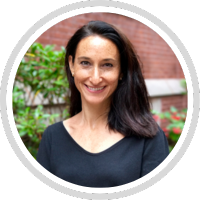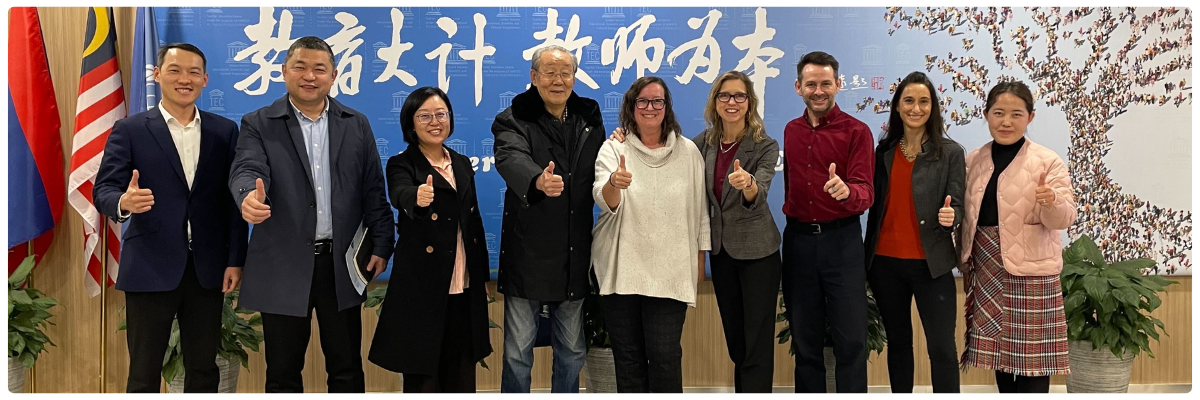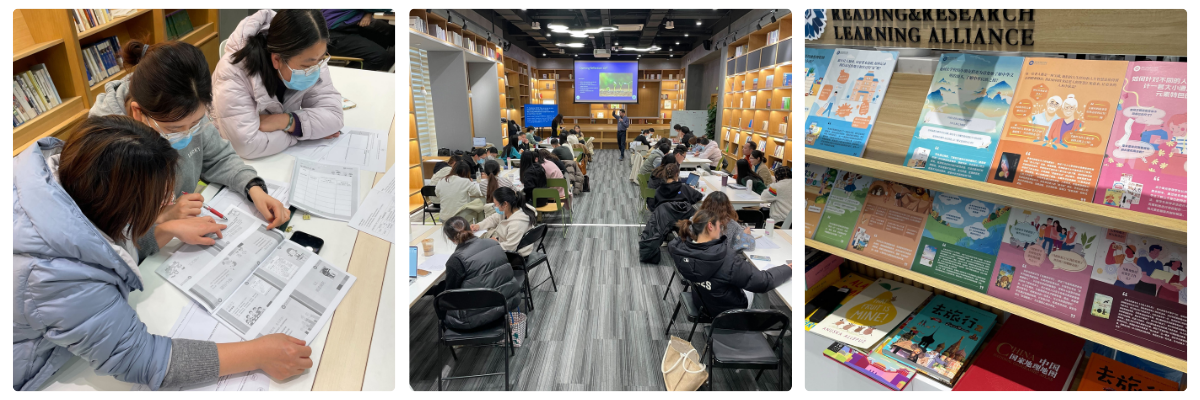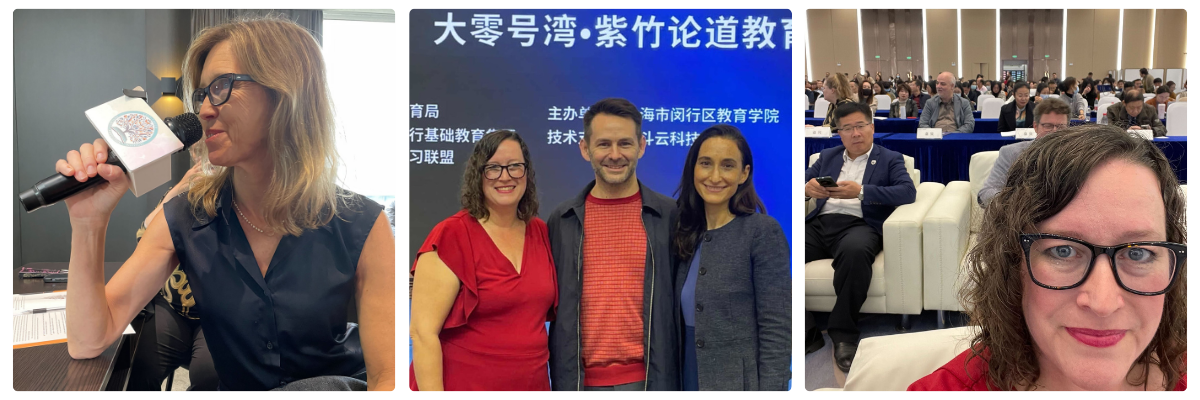|
Embarking on a journey through project-based mindsets and influences, alongside educators in China.
Our mission seemed somewhat straightforward: a weeklong workshop series for teacher educators in Shanghai focusing on PBL, or project-based learning. Considering the many workshops we have facilitated over the past two decades, ranging from topics such as creating rubrics to analyzing data, running a weeklong workshop in Shanghai on the topic of project-based learning is as fun as it gets!
We have partnered with YouCH, a professional development group in the MinHang section of Shanghai for several years, and have already facilitated workshops for YouCH educators on topics such as teacher research, 21st century learning, and fostering teacher leaders. YouCH, which is a play on words for supporting “youth” throughout the “ouch” of adolescence, is based in China, and our CPET team — Dr. Roberta Lenger Kang, Courtney Brown, G. Faith Little, Dr. Lance Ozier, and me — were all returning to Shanghai and looking forward to working with our YouCH colleagues again. Our plan for the week was solid: participants would work on a meaningful, real-life, weeklong project that would end with a culminating celebration. Mornings would be devoted to working on different aspects of our projects so that teachers could experience project-based learning on their own; in the afternoons, we would zoom out to unpack these experiences by debriefing the scaffolds within our lesson designs and teaching strategies; and finally, participants would have independent planning time. Excited for our workshop and visit to Shanghai, we packed our bags and we were ready to go! Cut to real life, post-pandemic. China had recently relaxed all of its COVID restrictions, resulting in a surge of colds and respiratory illnesses. A day after we arrived, we learned that schools were closing for most of the week due to the fear of spreading illness, and it was too late to reschedule our workshops. The best laid plans… A cultural exchange for educators
Instead of facilitating workshops, we found ourselves engaging in discussions and smaller sessions with our YouCH colleagues, participating in more formal meetings with the principal for Minghin High School, on a visit to the Huang Gongwang High School in HangZhou, and in meetings with professors and education officials in the Shanghai district.
Everywhere we went, we were welcomed warmly with tea and coffee, fruit and treats, and with a genuine love and interest in incorporating PBL into more schools throughout China. At the Teacher Education Centre under the auspices of UNESCO, the director inquired about the possibility of facilitating our PBL workshops in the western, more rural region of China, as a part of the “Rural Revitalization” program for teacher professional learning. They shared with us the belief that social and emotional wellbeing are important aspects of teacher education, as well as creativity — both of which are also key ingredients for project-based learning. At the Institute of General Education Shanghai Academy of Educational Sciences, we were greeted with Starbucks lattes and highlights from the professors’ research and papers on the importance of PBL. The director explained that PBL should not just be a “snack, but the main meal.” They believe curricula should ask real world questions, and students should be able to express themselves creatively as they research and present the possible answers. Again, we were amazed by the enthusiasm for PBL as a method to be included in all schools. Witnessing PBL in Shanghai
We also had the opportunity to meet teachers at a YouCH conference on PBL, and these teachers were already doing project-based learning units. At this full-day conference, we listened as elementary students showcased their PBL artifacts. We were most struck by Steven, a high school student, who shared his project — “Let’s Break the ‘Wall’ Together” — on period shame, which shines a light on the notion that menstruation is normal, yet girls are made to feel ashamed or embarrassed when they menstruate. This project evolved into a fundraising and social awareness project to combat period shame through education, and to raise funds to provide access to sanitary pads in more rural areas of China.
Not only were these students doing PBL, but the topics were open-minded and refreshing! Talking more to the teachers and students throughout the day, we realized that these student presentations were from a class that was dedicated solely to project-based learning In other words, these projects were not woven into their core curricular classes, but completed through an additional class. This is not to diminish the impressiveness of the projects (we were fawning over them!), but to highlight that including project-based learning into the core curriculum is a different endeavor. John Dewey's influence
Over a brunch of steaming dumplings, fish stew, and noodles on one of our final days in Shanghai, we asked Principal Jian from the MinHang section of Shanghai why he was so inspired and committed to PBL. Where did this inspiration come from?
He responded in Chinese, but we heard a name we recognized well in his explanation: John Dewey. The principal reminded us that Dewey spent time in China — two years and two months, the longest amount of time he spent anywhere abroad. Our Chinese colleague proudly recalled how Dewey not only shared his educational philosophy when he was in China from 1919-1921, but how he learned from Chinese culture, and was influenced by Chinese philosophies and practices. What does this mean for our work? Knowing this now, that at the center of the PBL work is a proud connection to Dewey, how might this influence our workshops, if we are given the opportunity to return? John Dewey believed that we must “give the pupils something to do, not something to learn; and the doing is of such a nature as to demand thinking; learning naturally results.” (1916, Democracy and Education). We can’t argue against learning by doing, but what does Dewey’s concept really look like in schools, on a day-to-day basis? Lessons from Maxine Greene
One of our CPET colleagues, Dr. Lance Ozier, reminded us all that our late and brilliant professor at Teachers College, Maxine Greene, was a student of Dewey’s. We were the last generation of students to have had Maxine as a professor, and we briefly swapped stories about her. My closest interaction to her was when my Narrative Research class with Professor Janet Miller visited her at her apartment, since she was 88 years old and no longer traveling to Teachers College. I happened to have my baby, Javier, who was just a few months old at the time, with me at her apartment.
Our class of doctoral students had prepared so many questions for Maxine; we were starting our doctoral research and wrestled with issues over perspective, what it means to be a fair researcher, and hungry for any writing suggestions to avoid being total bores. Maxine listened to our questions and nodded, but really could not stop looking at my baby. “He’s so curious,” she kept saying, “He just can’t get enough of the world!” Here we all were, excitedly trying to absorb as much of Maxine as we could, and here was Maxine, mesmerized by a baby. She was in awe of my baby’s curiosity, a spirit akin to her own. This is the kind of curiosity at the heart of research, teaching, and learning. And at the heart of project-based learning. What I remember most about our afternoon with Maxine is not her answers to our questions (we had so many!), but her authentic curiosity and interest in what was happening in front of her, and on that particular day, that happened to be watching my baby interact with the world by touching and poking at everything in his range. When we return to Shanghai, it is this curiosity that we will have to bring back with us, this curiosity that is at the heart of PBL, and at the heart of Dewey and Maxine Greene’s work. How do we infuse this deep curiosity and learning into our curricula, and our daily lessons? This will be our charge on our return. The realities of PBL
Although we did not have our weeklong workshop series, we did spend one afternoon with 75 teachers from the MinHang School, and gave them a taste of our PBL plans. One of the takeaways from that group of teachers was the importance of teaching students to ask questions, and then using student-generated questions to drive a curriculum. But we also can’t ignore some of the concerns we heard from the teachers, specifically: “PBL sounds like a lot of work, and who is going to support us?” We appreciated the real and honest question, and agree this needs to be ironed out. A new way of curriculum planning requires professional learning and ongoing support from colleagues.
We arrived in Shanghai with a plan to invite teachers to experience and then deconstruct project-based learning. It was a solid plan, but if we return, we may also invite teachers to reflect on the roots of PBL in China, namely, how do you plan with John Dewey’s philosophy in mind? We will keep our workshop practical, but also return to Dewey’s research: What does the constructivist teaching model look like in real life? How can we allow for more discovery for students? The interest in PBL is palatable, as we discovered in formal meetings and informal conversations with our YouCH colleagues. Our colleagues at the Shanghai Academy of Educational Sciences said it best: how do we make project-based learning the meal and not the snack? This is our collective charge. |
|
The Center for Professional Education of Teachers (CPET) at Teachers College, Columbia University is committed to making excellent and equitable education accessible worldwide. CPET unites theory and practice to promote transformational change. We design innovative projects, cultivate sustainable partnerships, and conduct research through direct and online services to youth and educators. Grounded in adult learning theories, our six core principles structure our customized approach and expand the capacities of educators around the world.
|
ABOUT US
525 West 120th Street, Box 182 New York, NY 10027 416 Zankel Ph: (212) 678-3161 [email protected] Our Team Career Opportunities |
RESOURCES
Professional Articles Ready-to-Use Resources Teaching Today Podcast Upcoming PD Opportunities |
COACHING SERVICES
Custom Coaching Global Learning Alliance Literacy Unbound New Teacher Network Student Press Initiative |





























